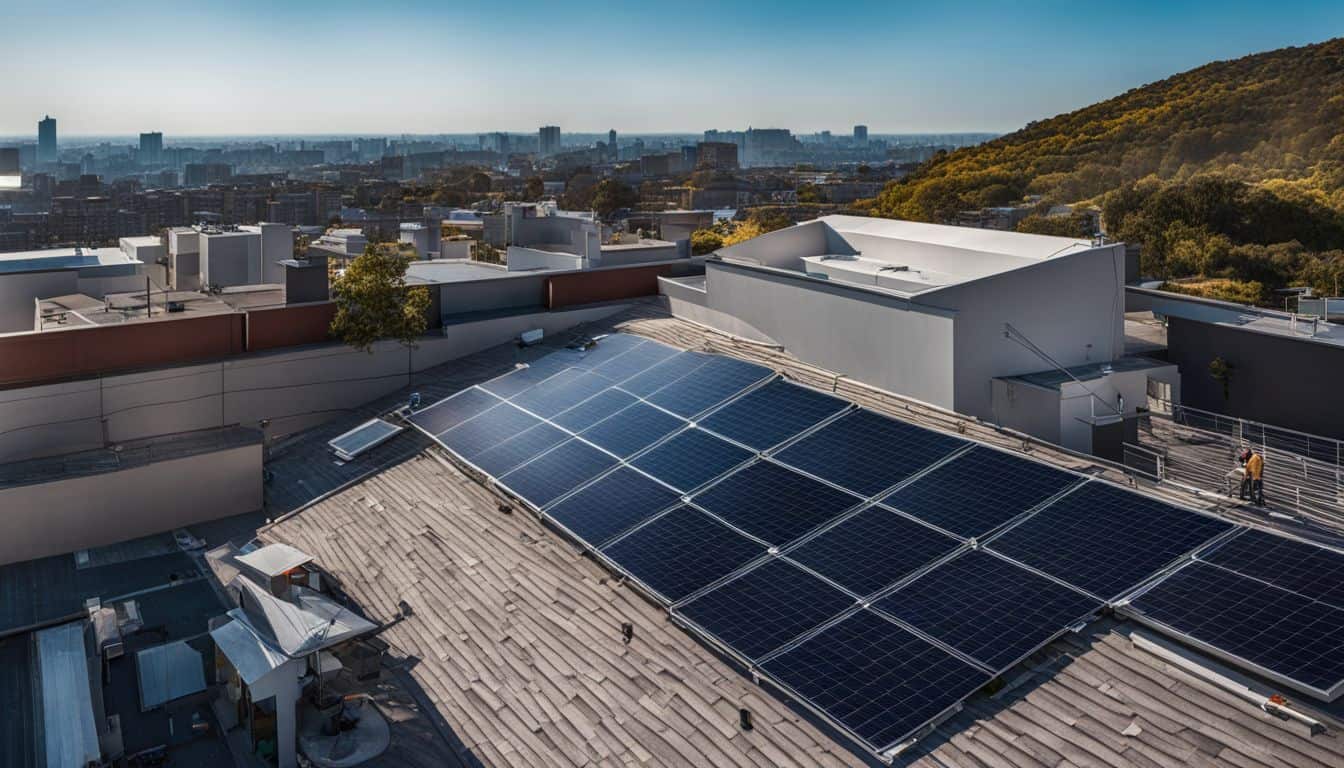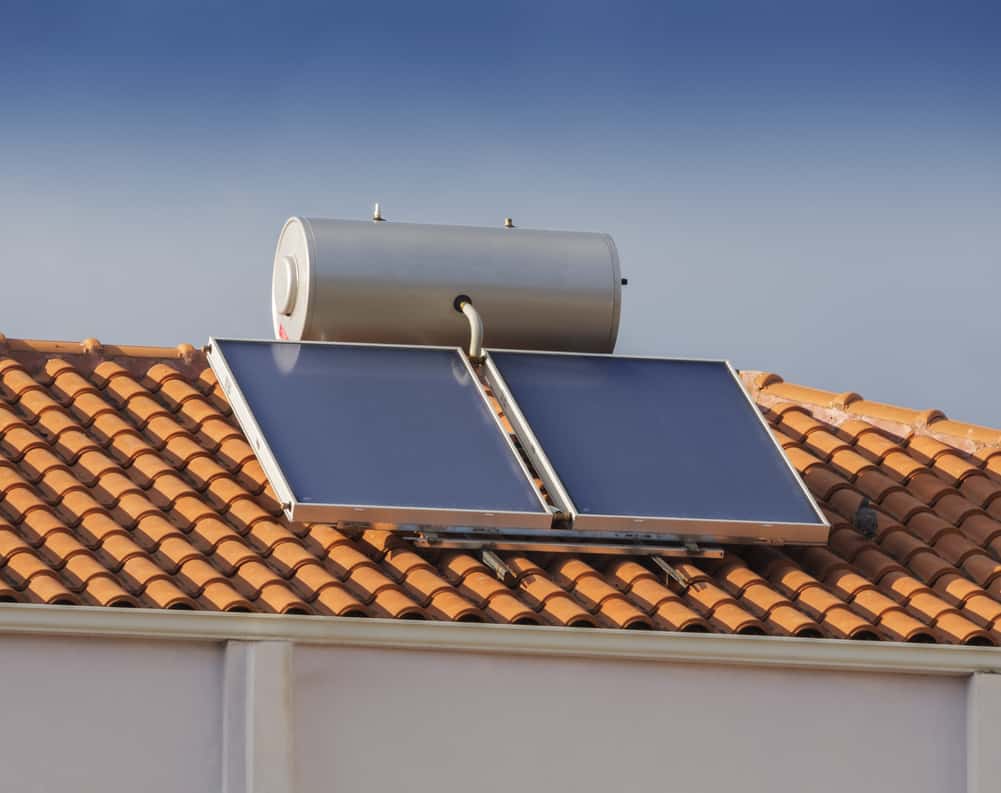Solar heating panels have emerged as an innovative and eco-friendly solution for homeowners looking to reduce their energy costs and carbon footprint. This comprehensive guide will walk you through everything you need to know about solar heating panels, from understanding the technology to installation and maintenance.
Understanding Solar Heating Systems
Solar heating systems harness the sun’s energy to provide heat for your home. There are two main types of solar heating panels: flat-plate collectors and evacuated tube collectors.
Flat-plate collectors consist of a dark absorber plate covered by a transparent cover. They are cost-effective and work well in most climates. Evacuated tube collectors use glass tubes with a vacuum inside, providing better insulation and higher efficiency, especially in colder regions.
A typical solar heating system comprises several key components:
- Solar collectors: These panels capture solar energy.
- Heat transfer fluid: This liquid or air carries heat from the collectors.
- Storage tank: This stores heated water for later use.
- Controller and pump: These manage the system’s operation and fluid circulation.
How Solar Heating Panels Work
Solar heating panels work by absorbing sunlight and converting it into heat. The heat transfer fluid circulates through the collectors, absorbing the heat. This heated fluid is then pumped to a storage tank or directly to the home’s heating system.
For a detailed explanation of how these systems integrate with existing home heating, check out our guide on integrating solar heating panels with home heating.
Applications of Solar Heating in Homes
Solar heating panels have various applications in residential settings:
- Water heating: Solar water heaters can provide up to 80% of a home’s hot water needs.
- Space heating: Solar energy can supplement or replace traditional heating systems.
- Pool heating: Solar panels can extend the swimming season by maintaining comfortable pool temperatures.
Choosing the Right Solar Heating System
Selecting the appropriate solar heating system involves assessing your home’s solar potential, determining your heating needs, and sizing your system accordingly. Factors to consider include:
- Your location and climate
- Roof orientation and available space
- Current energy consumption
- Budget and long-term savings goals
Installation Process
Installing solar heating panels requires careful planning and execution. The process typically involves:
- Site assessment: Evaluating your property’s solar potential and structural suitability.
- System design: Planning the layout and sizing of your solar heating system.
- Mounting and positioning panels: Ensuring optimal sun exposure and secure installation.
- Connecting to existing systems: Integrating the solar heating system with your home’s plumbing and heating infrastructure.
For a step-by-step guide to installation, visit our article on solar heating panels installation.
Cost Considerations
While the initial investment in solar heating panels can be significant, long-term savings and available incentives make them an attractive option for many homeowners. Costs to consider include:
- Equipment and installation expenses
- Potential upgrades to existing heating systems
- Maintenance costs
Many governments offer incentives, tax credits, and rebates to encourage solar adoption, which can significantly reduce the upfront costs. Over time, the energy savings from solar heating can result in a positive return on investment.
Maintenance and Care
Solar heating panels are generally low-maintenance, but regular care ensures optimal performance and longevity. Routine maintenance includes:
- Cleaning panels to remove dust and debris
- Checking for leaks or damage
- Monitoring system performance
Most issues can be prevented with regular inspections and timely repairs. For more in-depth guidance on maintaining your solar heating system, refer to our guide on mastering solar heating panels for homeowners.
Environmental Impact
One of the most significant benefits of solar heating panels is their positive environmental impact. By reducing reliance on fossil fuels, these systems help:
- Lower carbon emissions
- Decrease air pollution
- Conserve non-renewable resources
Moreover, solar heating contributes to energy independence, reducing the strain on the electrical grid and fostering a more sustainable energy landscape.
Future of Solar Heating Technology
The future of solar heating technology looks promising, with ongoing innovations enhancing efficiency and affordability. Emerging trends include:
- Integration with smart home systems for optimized energy management
- Advanced materials for improved heat absorption and retention
- Hybrid systems combining solar thermal with other renewable technologies
As technology advances, we can expect solar heating systems to become even more efficient, cost-effective, and accessible to homeowners.

Conclusion
Solar heating panels offer a sustainable, cost-effective solution for home heating needs. While the initial investment may seem daunting, the long-term benefits – including reduced energy costs, lower carbon emissions, and increased energy independence – make them an attractive option for many homeowners.
As you consider adopting solar heating technology, remember that each home is unique. Consulting with solar energy professionals can help you determine the best system for your specific needs and circumstances. With proper planning, installation, and maintenance, solar heating panels can provide clean, efficient energy for your home for decades to come.
FAQS
How can solar heating panels help homeowners save money on energy bills?
Solar heating panels offer significant cost savings for homeowners:
- They can reduce energy bills by generating free electricity from the sun
- Net metering policies allow excess solar power to be sold back to the grid for credits
- Solar panels can increase home value by an average of $15,000
- Government incentives and tax credits help offset the initial installation costs
What are the different types of solar heating panels available?
There are two main types of solar heating panels for residential use:
- Photovoltaic (PV) panels convert sunlight directly into electricity
- Solar thermal systems use the sun’s heat to warm water or air for home heating
- Some homes combine both PV and thermal panels for comprehensive solar energy
How often should solar heating panels be cleaned and maintained?
To keep solar heating panels operating at peak efficiency, follow these maintenance tips:
- Clean the panels at least twice a year to remove dirt, dust, and debris
- Schedule regular professional inspections to identify and fix any issues promptly
- Monitor your system’s performance and energy output to catch any problems early
- Trim nearby trees or foliage that may shade the panels and reduce their effectiveness
What factors should homeowners consider when choosing a solar heating system?
When selecting the right solar heating setup for your home, consider these key factors:
- Evaluate your home’s energy needs and consumption patterns
- Assess your roof’s sun exposure, orientation, and condition
- Determine your budget and explore financing options like loans or lease agreements
- Research available incentives, rebates, and tax credits to offset costs
- Choose a reputable solar installer with experience and strong warranties
Can solar heating panels completely eliminate my dependence on the grid?
While solar heating panels can significantly reduce your reliance on the grid, most homes still maintain a connection for backup power:
- Solar panels generate the most energy during daylight hours, so you may need grid power at night
- Cloudy weather or seasonal changes can affect solar energy production
- Battery storage systems can store excess solar power for later use, increasing self-sufficiency
- Net metering allows you to sell surplus solar energy back to the grid for credits
What should I look for when hiring a solar installer?
To find a reliable and experienced solar installer, consider these factors:
- Look for licensed and certified professionals with a proven track record
- Read reviews and ask for references from past clients
- Get detailed quotes from multiple installers to compare costs and services
- Ask about their experience with your specific roofing type and any potential issues
- Inquire about warranties for both the installation work and the solar panels themselves
- Confirm they assist with paperwork for permits, inspections, and incentive programs
How can I finance the installation of solar heating panels?
There are several financing options available for solar heating panel installations:
- Pay upfront with cash or a home equity loan for maximum long-term savings
- Explore solar loans that allow you to own the system with monthly payments
- Consider leasing options or Power Purchase Agreements (PPAs) for minimal upfront costs
- Take advantage of government incentives, tax credits, and rebates to reduce expenses
- Discuss financing options with your solar installer and compare terms and interest rates

Leave a Reply